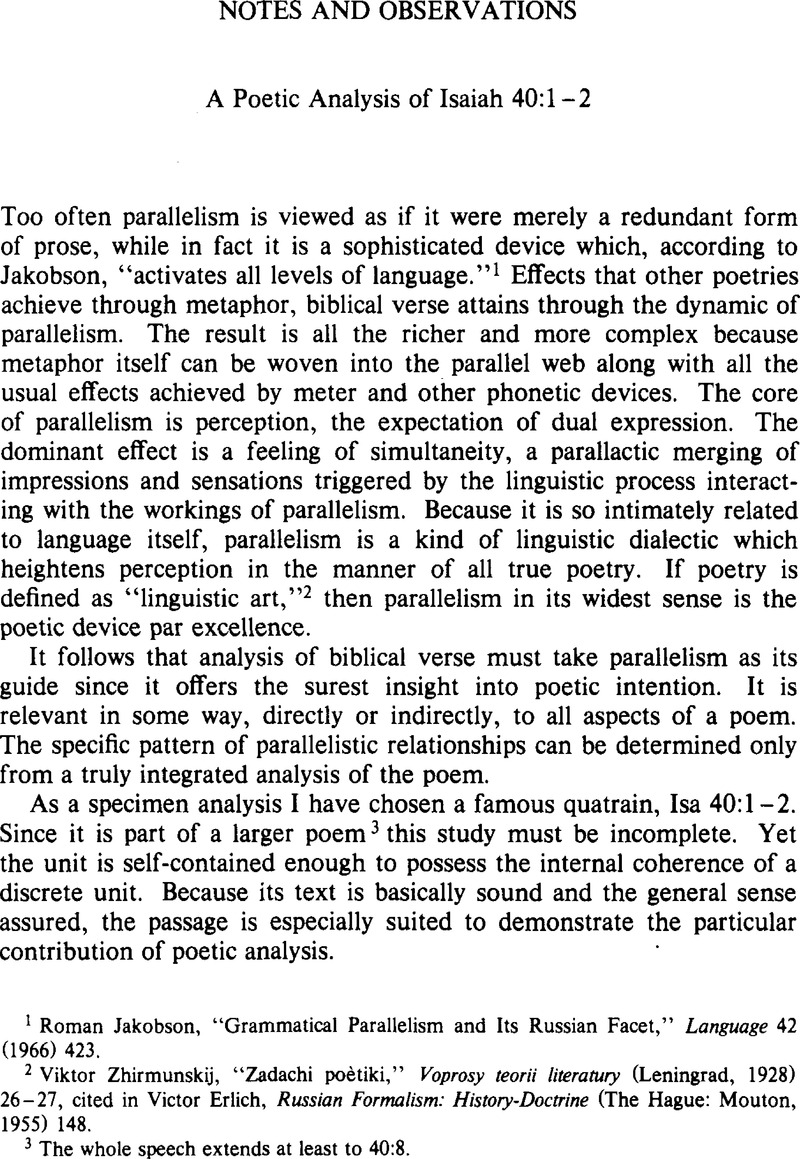Published online by Cambridge University Press: 10 June 2011

1 Jakobson, Roman, “Grammatical Parallelism and Its Russian Facet,” Language 42 (1966) 423.CrossRefGoogle Scholar
2 Zhirmunskij, Viktor, “Zadachi poètiki,” Voprosy teorii literatury (Leningrad, 1928) 26–27Google Scholar, cited in Erlich, Victor, Russian Formalism: History-Doctrine (The Hague: Mouton, 1955) 148Google Scholar
3 The whole speech extends at least to 40:8.
4 MT's mālěʾâ may be retained, despite lQIsa's mālēʾ; nor is a vocalization as piel millěʾâ required. The suffix is by attraction to its surroundings. In any case mālēʾ belongs to the class of verbs neutral as regards transitivity-intransitivity. It can occur with ʾet even in the qal; cf. Gen 1:22, 28; 9:1; 1 Kgs 18:34; Jer 23:24; 51:11. Here it can mean (literally): “she is complete in regard to service”; “she has fulfilled her service”; or, if ṣābāʾ is the subject, the feminine suffix is, as stated, by attraction. The latter term is feminine in Dan 8:12, but in an obscure context. Note the tense, perfect as present, as in solemn declarations: “is hereby declared completed.”.
5 There is no reason to posit a hypothetical rṣh II with a noncultic meaning like “pay back” or the like. The other occurrences of rāṣâ with ʾāwōn (Lev 26:34, 41; cf. 1:4 with kpr) certainly support the expected cultic sense.
6 On the nature of the scene, see Cross, Frank M., “The Council of Yahweh in Second Isaiah,” JNES 12 (1953) 274–77Google Scholar and his Canaanite Myth and Hebrew Epic (Cambridge: Harvard University Press, 1973) 187–88.Google Scholar More recently, see Mullen, E. Theodore Jr, The Assembly of the Gods (HSM 24; Chico: Scholars, 1980) 217ff.Google Scholar
7 If one replaces ʾêlōhěkem by simple ʾělōhîm or yhwh, as in 41:21 and 66:9, the thorn is pulled.
8 Exod 6:7; Lev 26:12; Deut 26:17–18; 29:12; 1 Sam 12:22; 2 Sam 7:24; Jer 7:23; 11:4; 30:25; Ezek 11:20, and many other examples.
9 The exclamatory effect is registered by the Vg's vocative, popule meus! It is grammatically possible that the people of Israel are being commissioned to comfort Jerusalem, but this is surely a forced interpretation. It is likely, however, that in vss 9–11 that city is commissioned to announce salvation to the (other) cities of Judah.
10 If the double imperative, so beloved by Second Isaiah, was perceived as an independent device, there may also be a caesura after the phrase naḣămû / naḣămû / ʾammî. This increases the staccato effect and also serves to isolate ʾammî for the convenantal nuance.
11 Note also the possible link of nḣm to nhm (“to groan, roar”) and possibly to nʾm (“to speak”). See Gitay, Yehoshua, “Deutero-Isaiah: Oral or Written?” JBL 99 (1980) 185–97Google Scholar, for a different but still affective interpretation.
12 The term is used differently by Rendsburg, Gary, “Janus Parallelism in Gen 49:26,” JBL 99 (1980) 291–93.Google Scholar
13 Ehrlich, Arnold, Mikra Ki-Pheshuto (3 vols; New York: Ktav, 1969) 3. 82.Google Scholar
14 On dabbēr ʾal lēb as “comfort,” parallel as here to nḣm, see Gen 50:21 (there a pun on both meanings) and Ruth 2:13. As “win over, woo” see Gen 33:6; Judg 19:3; 2 Sam 19:7; Hos 2:16. The connotation “woo, seduce, win over by words” is especially strong in Gen 34:3 since it seems there to be contrasted ironically with way ʾannêhā of the previous verse.
15 ṣābāʾ as military service is common; as priestly service, Num 4:3, 23, 30, etc.; as hired labor, Job 7:1; cf. Isa 16:14; 21:16. Śākār and pěʿula of vs 10 perhaps supports the latter sense, the parallel to nirṣâ ʿăwōnāh the priestly one.
16 It is likely that nirṣâ carries a more favorable connotation than kuppar (cf. Isa 6:7; 22:4) or the like. The very use of a cultic term is significant. Some cultic ʿāwōn is grave and demands death, but some is ritual only and is made good by a bath and change of clothes (cf. Lev 17:18 and, with ḣʾ, 5:lff). The gravity of Israel's crimes is uncertain, which is surely the poet's intention.
17 On mišneh as a penalty see Exod 22:3, 8; and in the context of sin and punishment, Jer 16:18 (mišneh ʿăwōnām wěḣaāʾtam). Also negative is Jer 17:18 (mišneh šibbārôn). The idea of Isa 61:7 is close to that of 40:2. The contrast between the two mišnehs in 61:7 depends on the negative connotations of the term, although as the same passage implies, there are also positive ones. So, the first born receives mišneh (or pî šěnayim) of the inheritance (cf. Deut 21:17). It is possible that Isa 40:2 is to be interpreted in the light of the legal penalties. In this case the sense would be that Israel has paid the proper fine, but no more. She and God are quits. But “proper” implies “equivalent,” a meaning some have posited for mišneh in Deut 15:18. See Rad, Gerhard von, “Kiplayim in Jes 40,2 = Äquivalent?” ZAW 19 (1967) 80–82.Google Scholar Yet perhaps it was to avoid such a nuance that the poet uses kiplayim in 40:2.
18 See esp. Isa 51:17, also with miyyad. Is miyyādēk in 51:22 not a play on the term in 51:17? Note that Jewish tradition simply imposes a positive meaning on line four, as does Ehrlich (Mikra Ki-Pheshuto, 3. 83). I think it very unlikely that běkol here means “despite,” as he suggests.